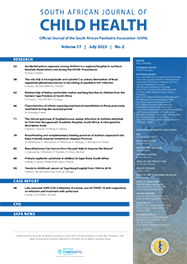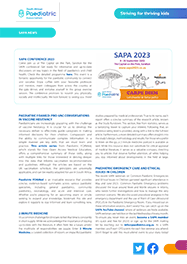Articles

A Pilot study to determine whether external stabilisation of the chest wall reduces the need for mechanical ventilation in preterm infants
Abstract
Objectives
To determine whether external stabilization of the chest wall with a splint reduces the need for mechanical ventilation in preterm infants.
Design
Non blinded prospective randomized controlled study. After consent was obtained, babies were randomized into a chest splint or control group.
Setting
Neonatal units of Johannesburg and Chris Hani Baragwanath hospitals
Subjects
Preterm infants with a birth weight between 1000 and 3200 grams with respiratory distress syndrome requiring more than 25% supplemental oxygen to maintain oxygen saturation above 90% during the first day of life.
Outcome measures
The primary outcome measure was the need for mechanical ventilation within 72 hours, secondary outcome measures were survival at 30 days, air leak and intraventricular haemorrhage.
Results and conclusions
This small study did not demonstrate any reduction in the need for ventilation with the use of the chest splint. There was no difference in the rate of survival or complications, indicating that the splint is safe to use. Further studies with larger numbers are warranted.
Authors' affiliations
Daynia E Ballot, University of the Witwatersrand
Peter A Cooper, University of the Witwatersrand
Barbara J Cory, Wits University
Sithembiso Velaphi, University of the Witwatersrand
Elaine Beckh Arnold, Wits University
Joyce Mlandu, Wits University
Charles Palmer, Penn Hershey State Hospital
Full Text
Keywords
Cite this article
Article History
Date published: 2009-02-02
Article Views
Full text views: 1969

.jpg)



Comments on this article
*Read our policy for posting comments here